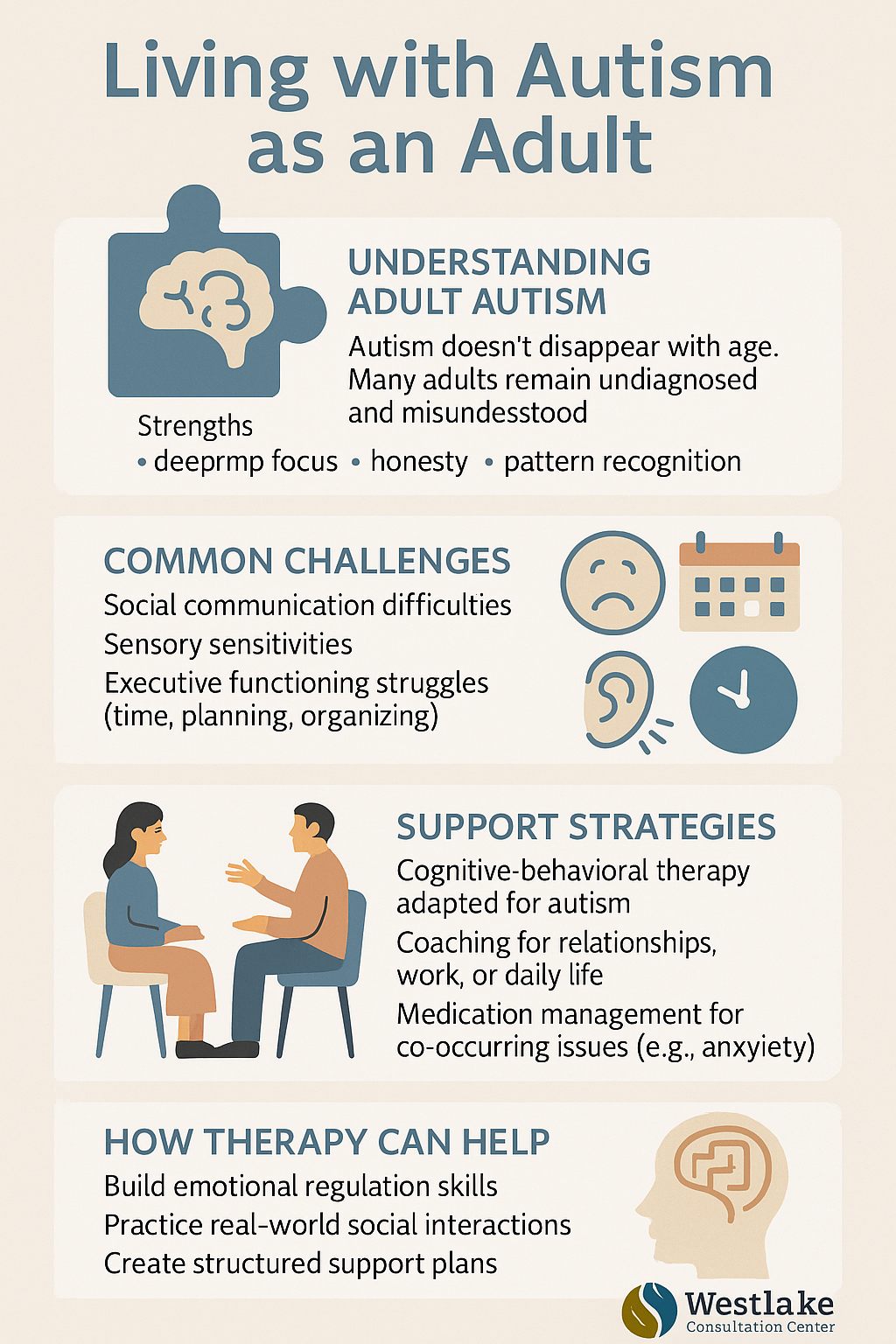Autism Doesn’t Have an Expiration Date
For years, public understanding of autism has centered around children. Diagnostic tools are built for kids. School-based interventions are emphasized. And conversations about support often end once a person turns 18.
But autism is lifelong. And for many adults on the spectrum, the biggest challenges begin after high school—when structured systems fall away and expectations for independence intensify.
At Westlake Consultation Center, we recognize that autism in adulthood deserves just as much care, understanding, and support as in childhood. In fact, it often requires more nuanced, tailored approaches that reflect the complexity of adult life—relationships, employment, self-identity, and mental health.
 How Autism Can Present in Adulthood
How Autism Can Present in Adulthood
Autism in adults doesn’t always look like a diagnosis on paper. It’s often an invisible difference in how someone thinks, processes information, or interacts with the world.
Adults with autism might:
- Struggle with unspoken social rules, even when intellectually capable
- Experience sensory overwhelm in loud or crowded environments
- Take language literally and feel confused by sarcasm or vague instructions
- Crave structure and predictability to feel calm and in control
- Feel emotionally exhausted after navigating social or workplace demands
And many are not diagnosed until adulthood—especially women, people of color, and those with average or above-average intelligence who “masked” their traits for years.
In fact, research suggests a growing number of adults are receiving an autism diagnosis later in life, often after years of misdiagnosis or internal struggle (Source – Scientific American).
The Unique Challenges Adults with Autism Face
The world is built for neurotypical minds. That makes navigating adulthood on the spectrum uniquely difficult. Common struggles include:
1. Employment and Career Barriers
Job interviews often reward charisma over competence. Open office plans can be sensory nightmares. Even simple workplace small talk can feel like navigating a foreign language. Despite having valuable skills, many autistic adults are underemployed—or unemployed—not because of ability, but due to a lack of workplace accommodations or understanding.
2. Social Isolation
Making and keeping friends can be difficult when you struggle with social reciprocity or emotional nuance. Adults on the spectrum often report feeling lonely but unsure how to connect, or emotionally exhausted from trying to fit in.
3. Mental Health Overload
Autistic adults are more likely to experience co-occurring conditions like anxiety, OCD, depression, and PTSD (Source – National Autistic Society). Years of masking or being misunderstood can take a toll. Without support, emotional burnout becomes a common reality.
4. Difficulty Accessing Services
Many autism services drop off after high school. Adults often don’t know where to turn for help—or feel they no longer “qualify.” Even those with a diagnosis can struggle to find clinicians trained to work with autistic adults.
What Meaningful Support Looks Like for Adults with Autism
Support for autistic adults must be as diverse as the spectrum itself. There is no one-size-fits-all model. But here’s what effective, compassionate support can include:
1. Neurodiversity-Affirming Therapy
Therapy should never aim to “fix” autism—but rather to support the individual in navigating a world that wasn’t designed for them. This includes:
- Helping develop coping strategies for anxiety and sensory regulation
- Processing trauma, burnout, or rejection from earlier life experiences
- Building communication tools that respect the person’s natural style
- Supporting identity development and self-acceptance
Westlake Consultation Center’s clinicians approach autism from a strengths-based perspective—offering validation, not correction.
2. Social and Relational Coaching: Building Connection Without Pretending to Be Someone You’re Not
Relationships—whether romantic, platonic, or professional—can be rewarding, but for many autistic adults, they come with a layer of constant decoding. Small talk can feel pointless. Jokes fall flat. Facial expressions don’t always mean what they seem to. And unspoken social rules often feel like a test you didn’t know you were taking.
Social and relational coaching isn’t about “fixing” these differences. It’s about helping individuals understand the rules of engagement in neurotypical spaces, if and when they want to—while still honoring their natural way of being. That might mean practicing how to initiate conversations, developing scripts for common social scenarios, or role-playing how to manage conflicts with coworkers or roommates in a way that feels respectful and clear.
Sessions may also explore how to navigate emotional reciprocity—like knowing when to ask a friend how they’re doing, or how to express empathy without relying on typical nonverbal cues. This work can be especially meaningful for adults who have experienced social isolation or who feel exhausted from years of masking.
The goal isn’t conformity. It’s confidence. Coaching provides tools, not rules—so adults on the spectrum can decide for themselves how, and if, they want to engage in specific relational dynamics.
3. Life Skills Support: Making the Everyday Feel More Doable
Budgeting. Grocery shopping. Keeping up with laundry. Managing a calendar. For many autistic adults, it’s not the big tasks that feel overwhelming—it’s the dozens of small, daily responsibilities that stack up and create chaos.
These challenges often stem from executive functioning differences: the brain’s ability to plan, prioritize, initiate, and complete tasks in an organized way. Without support, this can lead to missed bills, skipped meals, or a cycle of trying to “get it together” and burning out in the process.
Support in this area looks different for everyone. Some people benefit from external structure—using digital tools, visual schedules, or reminders. Others need help creating routines that feel natural and sustainable rather than rigid or forced. A therapist might collaborate with someone on building a morning routine that actually works with their energy levels, or break down complex tasks (like filing taxes) into manageable, non-overwhelming steps.
Importantly, this kind of support is never about shame. It’s about understanding that the tools you’ve been taught may not work for how your brain operates—and that there are other options that can.
4. Medication Management: Navigating Mental Health with Care and Precision
While autism itself isn’t something to be “treated” with medication, many autistic adults live with co-occurring conditions that can significantly affect their quality of life—such as anxiety, depression, ADHD, or sleep disorders. In these cases, thoughtful psychiatric support can be a valuable part of a broader care plan.
But medication for neurodivergent adults is not one-size-fits-all. Autistic individuals often have heightened sensitivity to side effects or respond differently to standard dosages. What helps one person focus or sleep may make another feel agitated or disconnected. That’s why medication decisions should always be made slowly, collaboratively, and with close monitoring.
A prescribing provider familiar with autism can help assess which symptoms are related to co-occurring conditions—and which are simply part of the individual’s neurotype. The goal isn’t to dull traits or force neurotypical behavior. It’s to reduce distress and improve daily functioning in a way that respects the person’s autonomy and lived experience.
For some, medication offers much-needed relief. For others, it’s a bridge to make therapy or life skills work more accessible. Either way, the process should feel empowering—not clinical or cold.
Late Diagnosis: A Journey of Unmasking
Many adults arrive at a diagnosis after years—sometimes decades—of confusion. They’ve cycled through labels like “difficult,” “awkward,” or “too sensitive.” They may have built entire identities around coping strategies that kept them from being misunderstood.
Receiving an autism diagnosis as an adult is often a mix of grief and relief:
- Grief for time lost, misunderstandings, and what could have been
- Relief in finally having a framework that makes sense
This moment of clarity is powerful. But it often requires support to unpack—and to rebuild a life around what is, not what others expected.
At Westlake we walk beside our clients through this unmasking process—helping them rediscover authenticity, agency, and peace.
External Resources for Further Reading
- Autistic Self Advocacy Network (ASAN) – A nonprofit run by and for autistic people
- National Institute of Mental Health: Autism Spectrum Disorder
- Spectrum News – News and research on autism from a scientific lens
- Scientific American – Diagnosing Autism in Adults
How Westlake Consultation Center Supports Autistic Adults
Westlake Consultation Center provides inclusive, personalized support for adults on the autism spectrum. Our team understands that autistic adults deserve more than just awareness—they deserve actionable, compassionate care. Services include:
- Autism-informed therapy sessions
- Evaluation and diagnosis for ASD in adulthood
- Help navigating co-occurring anxiety or depression
- Guidance for family members and partners
- Collaboration with local disability services and advocates
We’re not here to pathologize. We’re here to listen, guide, and create a space where neurodivergent adults feel safe and respected.
Ready to Take the Next Step? Let’s Talk.
If you or someone you love is navigating adulthood with autism—or wondering if it’s been part of the story all along—you’re not alone. Whether you’re seeking a diagnosis, support for daily challenges, or simply someone who understands, Westlake is here.
Reach out today to schedule a consultation with a clinician who sees the full spectrum of who you are—not just a label.



